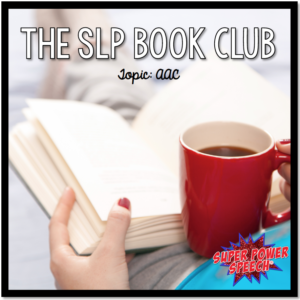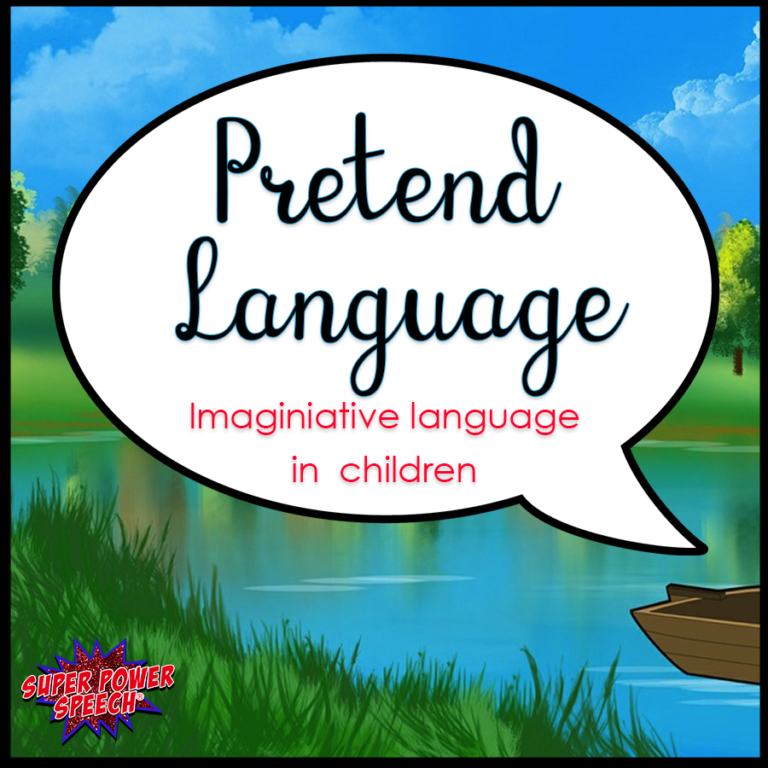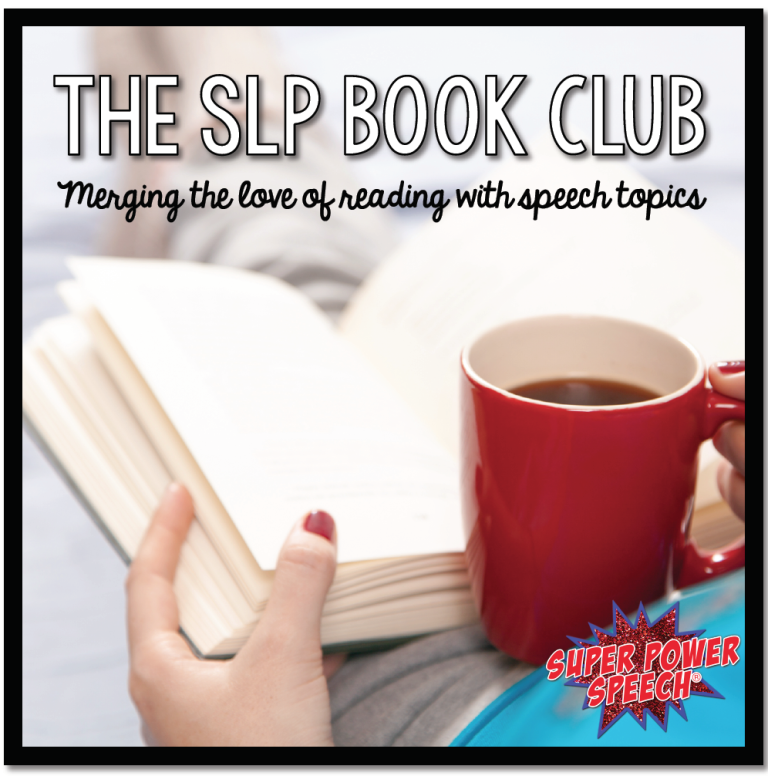The SLP Book Club: AAC

Welcome to the SLP Book Club! This book club has been my dream and my baby as an SLP and a bibliophile. I am so excited to find others out there that want to explore new books with me and discuss them in the comfort of your jammies and slippers!
Disclaimer: Amazon affiliate links included
Book 1: Ghost Boy
Author: Martin Pistorius
Genre: Memoir
Summary:
Within the short time period of 18 months, a rare and strange disease transforms Martin from a healthy 12-year-old to someone that I would describe as having “locked in” characteristics. Martin’s family is told that he has very little time left to live and that his cognitive skills have diminished to the level of an infant. His family almost breaks apart as the strain of caring for a suddenly disabled child, with an uncertain future, unhinges everything. Within a few years, however, Martin regains abilities that the doctors were sure were lost forever. He understands language and begins to control enough of his muscles that (with the help of a very perceptive caregiver) he begins to communicate. At first, his communication is with very slight eye, facial or hand movements. After years of extremely dedicated work and endurance, he becomes an amazing AAC communicator, who gets a job, moves to another continent, and at the end of the book marries the love of his life.
Overall rating: 3/5
Quotes to ponder:
To other people, I resembled a potted plant: something to be given water and left in the corner. (page 30)
People must make a conscious effort to look at me and listen to what I have to say. They must allow me the space to speak because I can’t butt in, but many don’t want to listen to the silence I create. (page 143)
And it was then that I realized that families might be the ones who pick up time and again but strangers can also rescue us–even if they don’t know they’re doing so. (page 201)
Discussion questions:
- What do you think about the various caretakers in the book? Why do you think they acted the way that they did?
- Multiple people in this memoir show amazing faith in Martin’s abilities. Who do you think had the greatest influence of Martin’s rehabilitation?
- What attracted Joanna to Martin and why do you think she pursued the relationship?
- What amazed you most about Martin’s story?
Book 2: Say What You Will
Author: Cammie McGovern
Genre: Young Adult
Summary:
Amy is brilliant and beautiful. She also has cerebral palsy. She uses AAC to communicate her amazing thoughts but has never had any real friends with which to communicate. So after convincing her parents to help, Amy spends her entire senior year of high school with paid “peers” rather than “adult” helpers within the school. Within these paid peers, Amy discovers friendship and love for the first time. It is energizing and new and exciting. She makes it a mission of her own to not only be helped by her peers but to help them as well. Everything changes, however, when Amy begins her first year at Stanford and loses the amazing support and relationships that she had spent a year building.
Overall rating: 4/5
Quotes to ponder:
The talking computer changed how everyone saw Amy. (Location 186)
I have learned that many people have disabilities they must make their peace with. (Location 1019)
“Yes, this will be hard,” Nicole would tell Amy as they practiced walking four or five hours a day through the first six years of Amy’s life. “But we’re not afraid of hard.” (Location 1193)
Discussion questions:
- What do you think about Amy’s experiment of having paid peer helpers?
- Do you feel that Amy’s parents were justified in their expectations for her helpers/social life?
- In what way do you feel Amy helped others the most?
- What did you think about the last portion of the book after Amy goes to Stanford?
Are you ready to start discussing? Comment below and make sure to comment on other people’s comments so that we can make this a full discussion! Think of your social skills groups… we need participation and turn-taking!










Martin’s comments on Loneliness really touched me. Communication and compassion plays such a central role in defeating Loneliness. At the end of Chapter 18, Martin talks about being badly positioned in his chair, and his father becoming aware of this problem: “After the conversation with his colleague, my father was always extra careful to position me gently and make sure I wasn’t trapping my testicles beneath me when he sat me in my wheelchair. Each time he did, Loneliness went snarling back to her solitary cave because when my father showed that he was thinking about me, we defeated Loneliness together.”
As SLPs, I think we are so essential in defeating loneliness.
I totally agree! So often it is easy to talk “over” the individual to others around or caretakers. That is not the way to combat Loneliness at all!
Agreed. His use of metaphor and personification were beautiful. I also just think Martin’s dad was great. Such an empathetic soul.
I did have difficulty with a comment Martin made in the Prologue as he is watching the other individuals in his care center. “My body like theirs, is a prison that I can’t escape: when I try to speak, I’m silent….There is just one difference between me and these children: my mind leaps and swoops…as it tries to break free of it’s confines…” His implication that he has things to say, and these other individuals do not really bothered me. The message we need to spread is that all non-verbal individuals need ways to communicate, and by assuming abilities, hopefully no one ends up trapped.
I thought that as well. He, of all people, should understand that what you see on the outside may not match the inside at all.
I loved Say What You Will. All of the characters were human, and therefore had obstacles they were trying to overcome. While Amy dealt with the obstacle of others’ perceptions of people who are nonverbal, other characters actually had more serious, although less visible obstacles. All the helpers had their various issues. Amy’s mom had hers…and it was interesting to watch her evolve from a “pushy Tiger” mom to a more empathetic, learning-to-be-hands-off mom over the course of the book. As parents, we all walk that fine line. As SLPs who work with parents, we help guide them in being strong advocates who let their kids become as independent at possible.
I thought everyone was pretty real until Amy leaves for college. Then I felt like the characters changed in a “book” way, but not real life way.
I agree….I thought the book was a 5 star until she graduated. Loved the description of Amy’s and Matthew’s metamorphoses. The book lost a couple stars when she agreed to hide alcohol in her walker. That seemed very out of character for Amy, although I know adolescence is when we all do surprising things. That was when things seemed to get manipulated in “the book way.”
Yes, the first time that I read the book, I gave it 5 stars. This most recent time I had to knock it down. Those pieces just bothered me too much.
I think I have found my new favorite genre: memoirs!I loved “Ghost Boy”, but it put me through the ringer, emotionally. How sad that Martin felt such shame for the situation he “put” his family in, as if he had any control over it. How horrid to watch his family fall apart in front of him. Such despair – in those early years of his “awakening”, he greatest excitement was just to see what kind of weather the day would bring. It is amazing that he is as well-adjusted as he is, considering all of the horrors he experienced – rejection, seclusion, isolation, emotional and sexual abuse (!!) at the hands of people who were supposed to take care of him. As I read, I kept thinking how angry I would be! It truly shows his strength. What a remarkable man.
One passage that struck me poignantly was when Martin was relating his experience with his counselor. Now that he had the ability to communicate, Martin longed to be “listened to”. He wanted to people to give him time and respect to participate in conversations. We don’t think about it in our fast-paced conversations, because we just open our mouths and what we want to say comes out. This passage reminded me to SLOW DOWN. With everyone, not just the kiddos I work with. To be a more compassionate communicator, overall.
I know, right?! I only recently realized how much I adore memoirs!
YES! I have had kids (not on my caseload) come talk to me because they know I will listen (and then help them figure out who can best help them. Working in the schools, we do need to be those ears, and then help others learn to do it as well.
That’s great. I often have kids in gen ed stop by my office, too 😉
I enjoyed Ghost Boy (haven’t been able to find the other book yet). In Ghost Boy on p. 139 he says “Communication is one of the things that makes us humans, and I am honored to have been given the chance to do it”. On p. 79 he talks about not being able to walk as insignificant to being speechless. “Words and speech separate us from the animal kingdom. They give us free will and agency as we use them to express our desires and refuse or accept what others want us to do”.
I teach SLP students. I am going to use this book and those quotes in my language disorders class. Actually I will be using it tomorrow as we start by discussing what communication is and why/how it is important. Thanks for bringing this book to my attention. I will also use it as an example in my clinic procedures classes to teach that we should always look closer at a person than appearance. Martin was unique from many of our clients as he has normal cognitive skills, but his story really pushes the point that everyone deserves a chance and to fight to give voice to those we work with.
I agree that passage touched me, as well. I love your idea of sharing it with your SLP students. I believe this discussion will be heading my interns way. Thanks for the idea!
“Say What You Will” was an OK book to me – as other contributors have already mentioned, I liked how the characters were portrayed as “human” – people with flaws, issues, etc., and that it’s ok and healthy to learn from each other and help each other. I just didn’t get into the book as much I did with “Ghost Boy”. I felt both books had similar themes in that both Martin and Amy wanted to participate in conversations and felt frustrated when they couldn’t get a word in edgewise in typical conversations. Taking that to heart!
I enjoyed “Say What You Will” and have similar comments as other readers. When in HS, I enjoyed Amy and Matthew’s relationship more. The prom and pregnancy storylines seemed more far-fetched. From a clinician POV, for students who could be like Matthew, I like how the book made me take pause to think about students who may be “more than just anxious” and truly need further support. Taking the time to watch and listen is so valuable. In Amy’s case, I did think it was interesting that she found a passion for playwriting at the end. This made me think of how important it is to follow our students’ leads, especially our non-verbal students or our students who use AAC, and let them express what motivates them and use that in therapy and in the academic setting. The world is so much more exciting when we are engaged in something that we truly love and that motivates us. 🙂
I have to share the irony in regard to three of the books recently chosen. “The Book of Unknown Americans” was set in Newark, Delaware. That’s where I lived when I did my medical internship. In “The Mango Princess”, Alan received rehabilitation at Magee Rehabilitation Hospital. I applied there when I was first starting my career, although education ended up being my chosen path. In “The Ghost Boy”, I had been thinking it’s a shame Martin doesn’t live in Pennsylvania. They were ahead of the game in providing grants for AAC equipment. I was wondering if the state was still as strong in this area. I haven’t lived in PA for awhile. I just had to laugh when I read that it was a professor from Temple University (Philadelphia), who had an important impact on Martin’s life. It’s been fun to make some connections with my early career.
Woah!!! Way to make connections!!
I enjoyed both books, but I liked “Ghost Boy” more because it was a true story. Martin and his family have had an amazing journey. Martin is a beautiful writer and communicator. I appreciated his openness in sharing his story.
Yes… I seem to enjoy the true story accounts more these days as well!
An additional thought…I liked that Amy had peer helpers. I don’t know about the “paid” part. At our HS, for students who participate in the Life Skills program, which would probably not have been Amy based on her other abilities, typical peers volunteer during most periods of the school day. When I was the SLP at the HS, the special education teacher for the Life Skills class and I started a reverse inclusion communication group and the paraprofessionals took a step back and the peers were the communication partners. It had nice carryover when students would greet and support each other in the halls or during inclusion times as well.
Great idea!
I actually don’t mind the “paid” part too much. It really did evolve into friendships for most of the peer helpers.
I wondered where the SLP or other staff was in supporting her progress towards independence. The mom was pretty overbearing, but you can’t blame her if she was Amy’s sole advocate.
I agree Linda, I also thought about the lack of SLP presence also when I read the book.
Thanks everyone for participating!! Andrea is our winner for this book club!
Sorry I am late to reply though I thought I would post a few things anyway anyway since I was in here checking out the comments 🙂 … a few interesting nuggets to start the school year out with. Didn’t get to Ghost Boy but had bought it and now I really want to read it!!